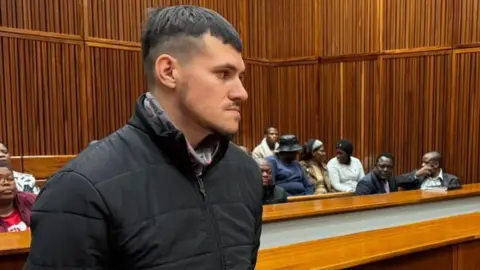The shocking news emerging from South Africa has stirred national outrage as the state prosecutor officially withdrew charges against a farm worker implicated in a gruesome murder case. The accused, Adrian de Wet, was one of three men facing charges related to the deaths of two black women, Maria Makgato, aged 45, and Lucia Ndlovu, aged 34, who were allegedly killed while scavenging for food on a pig farm near Polokwane in Limpopo province last year. The horrific nature of the allegations—specifically that their bodies were fed to pigs—has ignited intense feelings of anger, grief, and frustration across the nation.
De Wet, now 20 years old, had been expected to face justice alongside his fellow co-accused; however, as the trial commenced, he unexpectedly turned state witness. This pivotal decision culminated in his withdrawal from the case and his subsequent departure from courtroom proceedings as a free man. During the trials, he revealed that the farm owner, Zachariah Johannes Olivier, was the one who allegedly shot the two women. De Wet’s testimony sheds light on the event that occurred in August 2024, when Makgato and Ndlovu lost their lives, potentially framing Olivier as the prime perpetrator.
The controversial withdrawal of the charges, which led to De Wet’s freedom, was characterized by a swirl of emotions both inside and outside the courtroom. He walked away from the courthouse as his lawyers shielded him from the media, while emotional scenes unfolded as Walter Makgato, the brother of one of the victims, sobbed in distress outside the building. He expressed his belief that the release of De Wet indicated a deep failure of the justice system—a sentiment that resonates broadly with those who view this incident as emblematic of a larger racial and social struggle in South Africa.
The significance of this case transcends the individual tragedy of Makgato and Ndlovu. It resonates with an undercurrent of racial tension that persists in the country long after the dismantling of apartheid three decades ago. Despite the progress made in many areas, economic disparities remain evident, particularly in rural sectors where land ownership is predominantly held by the white minority. Many black farmworkers live under harsh conditions, fostering a growing resentment towards those who possess both the land and wealth.
De Wet’s lawyers argue that he operated under duress when disposing of the women’s bodies, suggesting that his collaboration with law enforcement is a necessary step towards truth and accountability. This aspect, however, has opened up a Pandora’s box of ethical dilemmas regarding coercion, guilt, and the complexities of justice in a society still grappling with its apartheid-era legacy.
In addition to De Wet, the case continues against two others: William Musora, aged 50, and Olivier, now 60, who remain in custody, yet to enter a plea. As the trial is set to resume on October 6, the case has drawn not only national attention but international scrutiny as well. News outlets and social media platforms are filled with discourse reflecting the outrage and disbelief expressed by both South Africans and observers beyond its borders.
This trial is likely to serve as a flashpoint for conversations about race relations, justice, and societal accountability in contemporary South Africa. As communities await further developments, the emotional scars left by this abhorrent act will linger, complicating the road to healing and resolution against a background of continuing inequality and strife. The ramifications extend into broader discussions on systemic issues that influence the daily lives of many, emphasizing the urgency of addressing these challenges head-on as South Africa collectively seeks paths to reconciliation and justice for all its citizens.











